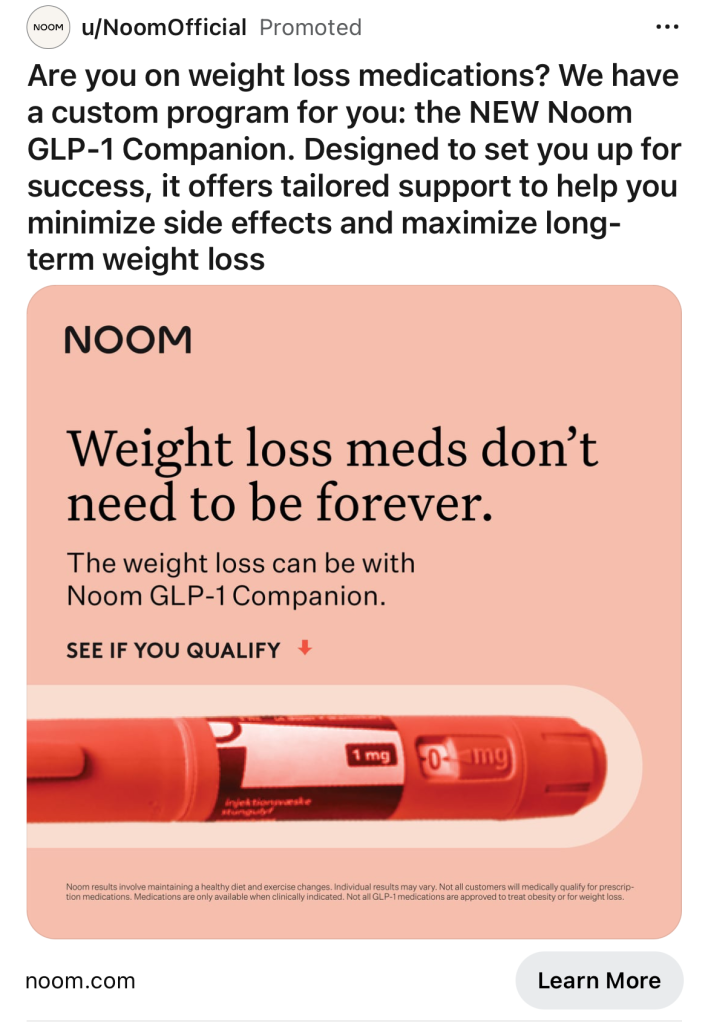These weight-loss startups tell customers they can stop taking Ozempic or Wegovy and
“Ozempic doesn’t have to be forever.”
It’s a line that may appear on your social media feeds if you’ve googled how to lose weight, or read up on Hollywood’s latest miracle drug: Ozempic. The pink ad, posted as part of a campaign on Reddit, Instagram, and Facebook in recent months by the $3.7 billion weight-loss startup Noom, shows the drug’s blue syringe pen moving back and forth below a timeline that doesn’t extend beyond a year.
What the ad promises is nothing short of the Holy Grail of the $90 billion U.S. diet industry, the cure that Americans, especially American women, have sought for generations and are willing to pay dearly for: a new, more slender you, hassle-free. Quick weight loss, then a return to your familiar life—thinner, healthier, and happier. It’s no wonder that, since this new class of appetite-curbing GLP-1 medications, including Ozempic, Wegovy, and Zepbound, burst into public consciousness, nearly $1 billion of venture capital dollars have been injected into the growing sector of weight-loss companies, which is now awash with startups prescribing the drugs, according to PitchBook data from the last year and a half.
It’s true that these medicines appear to be startlingly effective for weight loss, a game changer for many people with obesity. But the second part of what some startups prescribing these medications promise—the “doesn’t have to be forever” part, or the notion that these drugs can “reset” your metabolism—is far more contentious. As the drug manufacturers Novo Nordisk and Eli Lilly have made exceedingly clear, these medicines are intended as long-term commitments, like medication for high blood pressure. They are not meant to be taken temporarily.
Indeed, seven doctors who spoke with Fortune say the preponderance of medical trials so far show that generally, people who stop taking the drugs regain most of the weight they’ve lost within about a year. Fortune also spoke with half a dozen people who had stopped taking GLP-1 medications—all of whom said they started regaining the weight they had lost when they stopped taking the medications and their food cravings returned.
“There is no such thing as a ‘metabolic reset,’” says Dr. Angela Fitch, chief medical officer of Knownwell, a primary care and obesity medicine provider, and past president of the Obesity Medicine Association. Dr. Caroline Apovian, the co-director of the Center for Weight Management and Wellness at Brigham and Women’s Hospital, agrees: “The studies show over and over and over again,” Apovian says, that if you stop taking the medications, “you will regain the weight back.”
Noom isn’t the only startup to market GLP-1s as temporary treatments that offer long-term effects. Calibrate, which began prescribing anti-obesity medications in 2020 as part of a weight loss program, prominently describes the drugs as a “temporary aid to improve your metabolic health.” In Denmark, a venture-backed startup, Embla, says on its website that it offers GLP-1s “always with the clear aim of a healthy transition off medication once you’ve reached your goals.” (Other companies, including the weight-loss giant WeightWatchers and more recent incumbents such as Ro, have begun dabbling in GLP-1 medications, too, though they are clear in their messaging that these drugs are meant to be taken long-term.)

A spokeswoman for Noom frames the issue as partly one of customer demand: When asked about the company’s marketing of Ozempic as a drug to take for a limited time, she emphasized that most patients don’t want to stay on the medications forever, noting that research showing that “68% of people stop taking the GLP-1 by month 12 suggests a reticence to a forever medication by many. It would be difficult to stress this point enough.”
While GLP-1 medications have been on the market to treat type 2 diabetes for decades, it is only recently that some have been adapted, and approved by the U.S. Food and Drug Administration (FDA), as a treatment for weight loss—so the research on these drugs, and their long-term side effects and risks, is still nascent. And the question of whether people can maintain weight loss after going off GLP-1 medications is an ongoing area of study: The science is far from settled.
Noom, Calibrate, and Embla say there is preliminary data to support their contention that many people can maintain weight loss through exercise and diet after stopping the medications (though some of the doctors Fortune spoke with were skeptical of those studies). Anecdotally, there are examples of people who have managed to do so by sticking to strict diets and exercise regimens.
But it’s clear that not everyone can maintain such an intensive regimen—that’s part of the problem the weight-loss drugs are meant to solve. And with so little definitive data on the long-term health effects of taking—or stopping—this new class of drugs, weight-loss companies’ suggestion that the drugs can be taken temporarily is worrying, says Ragen Chastain, a researcher, board-certified patient advocate, and author of a newsletter that explores weight science. “They are making long-term promises based on short-term data,” she says, pointing out that even that data “still doesn’t necessarily actually support the claims that they’re making.”
—Dr. Angela Fitch, chief medical officer of KnownwellThere is no such thing as a ‘metabolic reset.’
For now, the medication-aided weight loss industry…
Read More: These weight-loss startups tell customers they can stop taking Ozempic or Wegovy and
2024-07-10 08:16:34
